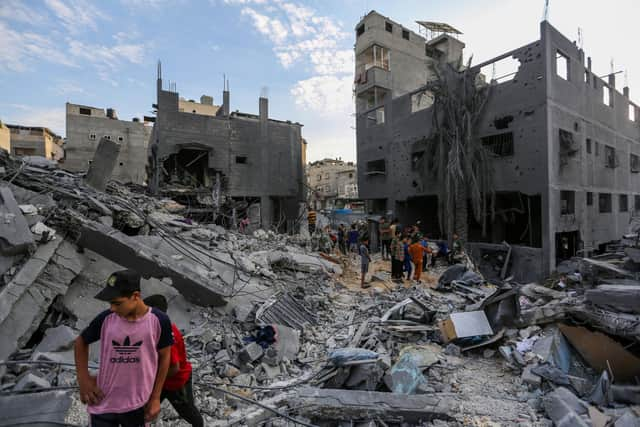Israel conflict: Is Israel coming under international pressure, from China to Qatar, Germany and Turkey, to ease off on Gaza attacks?
When Hamas militants stormed Israel three weeks ago, killing hundreds of people and taking others hostage, the immediate response from Western governments was clear – the country had a right to defend itself.
However, as Benjamin Netanyahu’s government began in earnest its retaliatory strikes against Gaza – flattening entire neighbourhoods and blockading the strip to leave it without food, water and fuel – some began to urge caution. Some leaders have called strongly for the creation of a humanitarian “pause” in the attacks to allow aid to get through to Gazan citizens, something Israel has so far vehemently refused to do.
Advertisement
Hide AdAdvertisement
Hide AdProfessor Clive Jones, chair in regional security at the University of Durham, said he believed there was more going on behind the scenes than was publicly known – with some countries likely to be working to influence Mr Netanyahu in a bid to minimise civilian deaths. Others will focus on brokering diplomacy to secure the release of hostages taken from Israel three weeks ago.


"There are undoubtedly several moving parts, some obvious, some discreet,” says Prof Jones. “We know that Qatar – a long-time interlocutor between Israel and Hamas – has been trying to use TRACK 2 diplomacy to secure the release of more hostages.
"It’s likely that other actors too are in the mix, notably Germany and Turkey, who have been influential in the past. Hamas use of the hostages is instrumental – it will release more, I’m sure, but the scope and pace of this is contingent of course on Israel’s actions.”
In recent days, the international debate has become less about Israel versus Palestine and more about the humanitarian crisis in Gaza.
But despite international pressure, Israel has so far shown little restraint in its vows to “rain hellfire down on Hamas”. More than 6,000 people have now been killed in Gaza, where power has run out. Hospitals have been forced to close and aid organisations have warned food and water is scarce.


Prof Jones said: "The real hope I think for Hamas is that it buys enough time to sow doubts in the international community for pressure to be placed on Israel to ease the bombing or, better still, halt it all together.
"Netanyahu is under pressure from the US and other Western states with dual nationals held in captivity, as well as growing pressure from within Israel to put the lives of the hostages first. This, on top of the visual images of Palestinian casualties, is closing the military’s window of opportunity to act and act decisively.”
He adds: “What is clear, is that Netanyahu’s strategy of dealing with the Palestinians ‘outside-in’ – make peace with the Arab states first and then deal with the Palestinians from a position of strength – has failed.”
Advertisement
Hide AdAdvertisement
Hide AdTwo United Nations Security Council resolutions, both of which called for a humanitarian pause in the conflict to allow aid to be taken into Gaza, were rejected this week amid political disagreement, following another on October 18, which was blocked by the US.
Voting against Brazil’s proposal last week, the US’s UN delegate told the council it needed to let the “hard work of diplomacy” undertaken by her country “play out”. However, what that “hard work of diplomacy” is – and exactly what its aims are – are unspecified.
The US, one of Israel’s closest allies – the country is the largest cumulative recipient of US foreign assistance since World War Two – has repeatedly insisted that it is asking “tough questions” of Israel over the protection of civilians in Gaza, but has also sent military advisors and other support to Tel Aviv.
US military bases in Iraq and Syria have already come under attack 13 times in the past week, according to the Pentagon, drawing the US more personally into tensions in the Middle East. It is not known exactly who is behind the attacks, which have mainly been intercepted – but one network, calling itself the Islamic Resistance in Iraq, has taken credit for at least 11 of the incidents.
Those attacks prompted the US to yesterday launch airstrikes on two locations in eastern Syria linked to Iran’s revolutionary guard corps.
Prof Jones said: "While clear in his backing for Israel – this is the first time Washington has actually put US assets on the front line in support of Israel with the deployment of two carrier groups in the East Mediterranean – he [Joe Biden] was clear during his visit to Israel and back in Washington that Israel needs to think about the end game.
“I sense he is not convinced that Israel has clearly defined goals in the war much beyond the destruction of Hamas. He’s warned Israel; of the prolonged costs of military intervention and I’m sure behind the scenes, a frank discussion is being had with Netanyahu about pushing for a political endgame with the Palestinians.”
Meanwhile, within the UK, the issue has already further divided politicians.
Advertisement
Hide AdAdvertisement
Hide AdPrime Minister Rishi Sunak has supported "specific pauses" in the Israel-Hamas war, saying more aid needed to be allowed into Gaza. However, his spokesman said the Prime Minister did not back a ceasefire as he believed that would only benefit Hamas.
Mr Sunak’s views have, somewhat controversially, been echoed by Labour Party leader Sir Keir Starmer, who has also fallen short of calling for a ceasefire.
First Minister Humza Yousaf, whose parents-in-law are trapped in Gaza, has taken a stronger stance, branding the UK Government’s response “infuriating”.
"I cannot understand the PM’s position, or Keir Starmer’s position – and those of other parties – on not calling for a ceasefire to allow more aid into Gaza,” he said. "How many more children have to die before a ceasefire is called for?”
Other countries, as well as the UN itself, have warned Israel’s bombardment of Gaza could be in breach of international law.
Ireland’s Prime Minister Leo Varadkar called Netanyahu’s government’s actions a violation of international humanitarian law and collective punishment, while Norwegian foreign minister Anniken Huitfeldt has also deemed the move “unacceptable”.
“The establishment of a full blockade, including on access to electricity, water, food and other goods that are indispensable for the survival of the civilian population in Gaza, is unacceptable,” Ms Huitfeldt said.
The problem is, to a large extent, geopolitical. The countries which have demonstrated most condemnation of Israel are those with which the West is not otherwise aligned. China is one of the few major powers to speak out strongly against Israel’s actions.
Advertisement
Hide AdAdvertisement
Hide AdChinese foreign minister Wang Yi has described Israel’s bombardment of civilians in Gaza as actions that “have gone beyond the scope of self defence”. However, it has not yet condemned Hamas’s atrocities against civilians.
"As in Ukraine, China is positioning itself as a peace-seeking, ‘neutral’ great power, in contrast to the US, whose committed support for Israel is depicted by Beijing as a destabilising, violent influence in the region,” said Ahmed Aboudouh, associate fellow, Middle East and North Africa Programme at Chatham House in a recent report.
"It is now clear that China is adopting the Ukraine playbook on the Israel–Hamas war, seeking to publicly chart a different course from the US and its allies and their unconditional support for Israel.”
Comments
Want to join the conversation? Please or to comment on this article.
